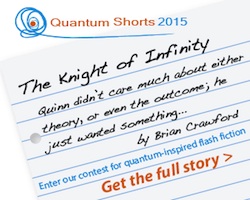Scientific American, Nature, and Tor Books are thrilled to announce the launch of the 2015 Quantum Shorts competition! The contest encourages readers to create quantum-themed “flash fiction”: a short story of fewer than 1000 words that is inspired by quantum physics. Scientific American, the longest continuously published magazine in the U.S., Nature, the world’s leading multidisciplinary science journal, and Tor Books, the leading science fiction and fantasy publisher, are media partners for the contest run by the Centre for Quantum Technologies at the National University of Singapore.
A panel of judges will select the winners and runner-ups in two categories: Open and Youth. The public will also vote and decide the People’s Choice Prize from entries shortlisted across both categories. Winners will receive a trophy, a cash prize and a one-year digital subscription to ScientificAmerican.com. The winner of the Open category will also be featured on ScientificAmerican.com.
Entries can be submitted now through 11:59:59 PM ET on December 1, 2015! Submissions to Quantum Shorts 2015 are limited to 1000 words and can be entered into the Quantum Shorts competition via their website, which also features a full set of rules and guidelines.
The quantum world offers lots of scope for enthralling characters and mind-blowing plot twists, according to Artur Ekert, director of the Centre for Quantum Technologies, co-inventor of quantum cryptography, and one of the Open category judges. “A writer has plenty to play with when science allows things to be in two places—or even two universes—at once,” he says. “The result might be funny, tense or even confusing. But it certainly won’t be boring.”
Another judge is Colin Sullivan, editor of Futures, Nature’s own science-themed fiction strand. “Science fiction is a powerful and innovative genre,” Colin says. “We are excited to see what kinds of stories quantum physics can inspire.”
Scientific American Editor-in-Chief and competition judge Mariette DiChristina is excited to see this years entries, saying, “Quantum physics seems to inspire creative minds, so we can’t wait to see what this year’s contest will bring.”
The 2015 Quantum Shorts contest is also supported by scientific partners around the world. The scientific partners are the Centre for Engineered Quantum Systems, an Australian Research Council Centre of Excellence, the Institute for Quantum Computing at the University of Waterloo, the Institute for Quantum Information and Matter at Caltech and the Joint Quantum Institute of the University of Maryland, and the National Institute of Standards and Technology.
For more information about the organizer and partners, please visit the competition website!











Corrigendum:
ht tp://shorts2015.quantumlah.org/
This I think is the correct address – unless you wish to go back in time and enter a previous competition?